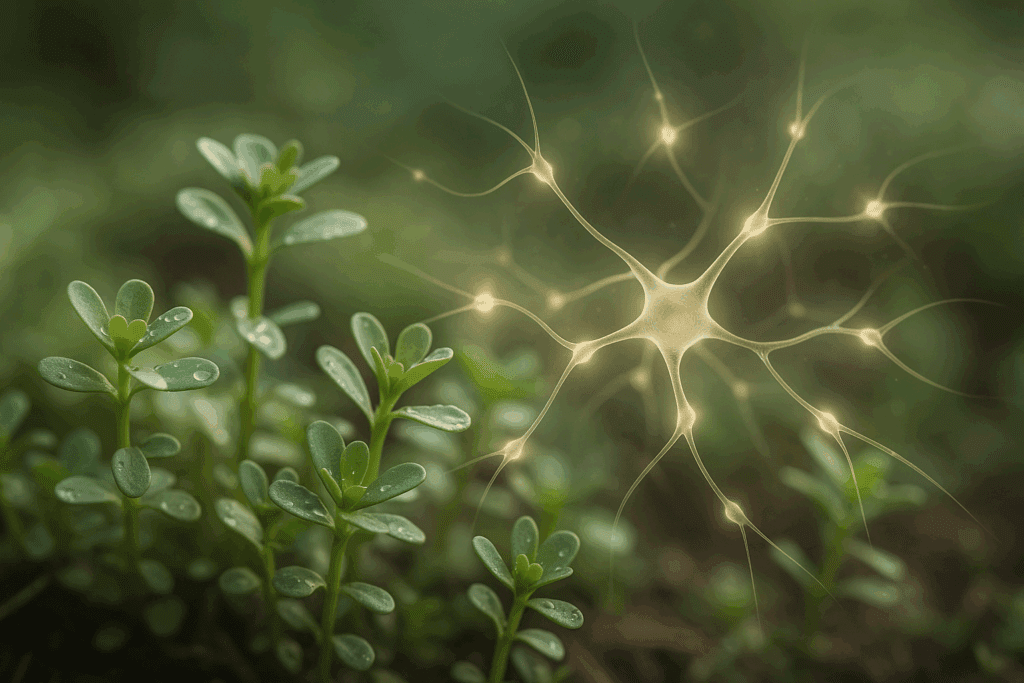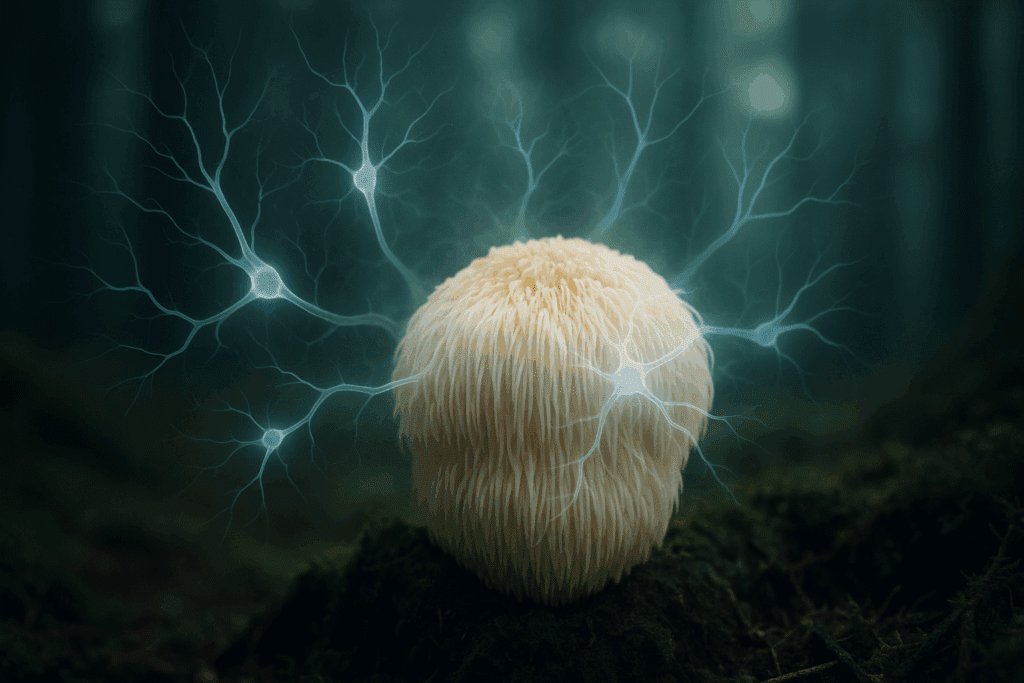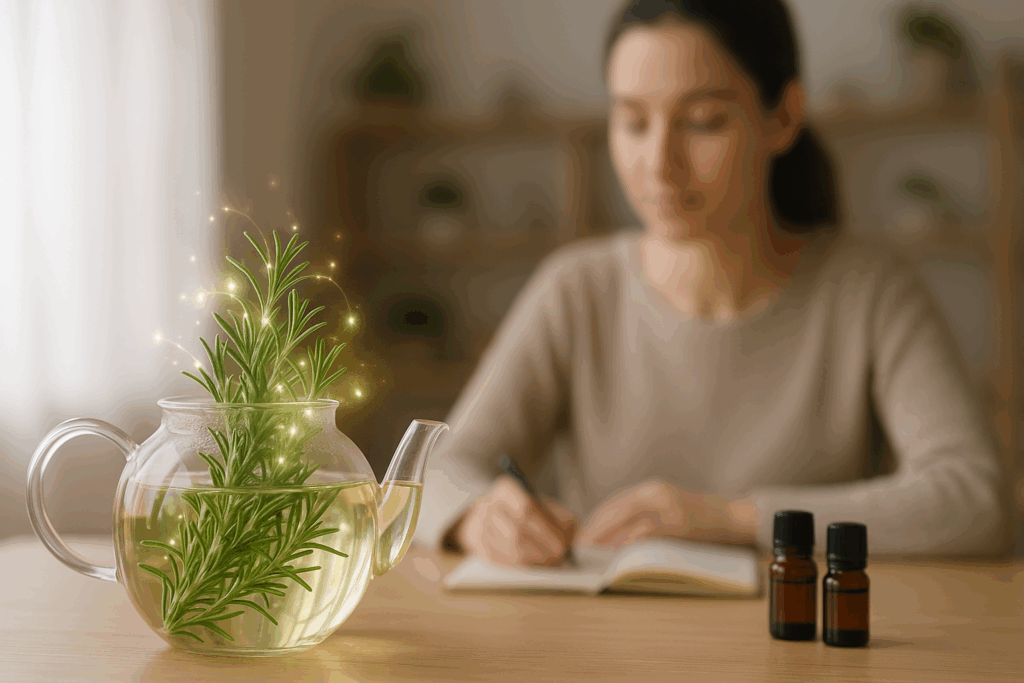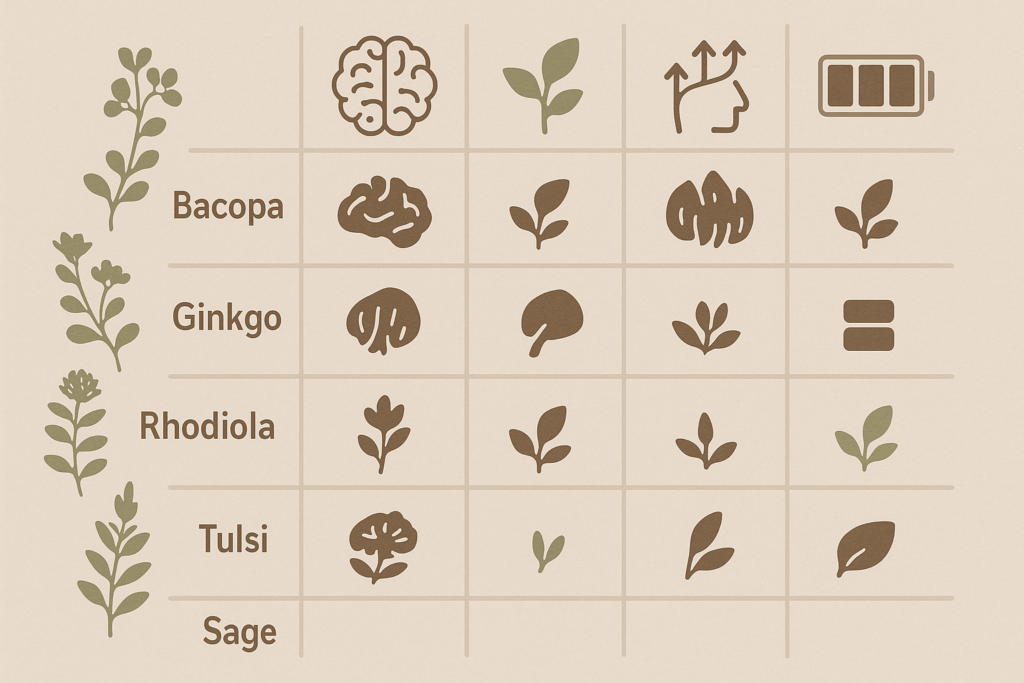The Science Behind Herbs for Focus and Mental Performance
In a world increasingly shaped by information overload, stress, and endless digital distractions, maintaining concentration and mental acuity has become more than a luxury—it’s a necessity. Whether you’re a college student navigating rigorous academics or a professional juggling complex projects, the demand for sharper focus and sustained cognitive performance is universal. Among the many natural approaches being explored to meet this demand, herbs for focus have emerged as both a traditional and scientifically supported solution. Rooted in centuries of medicinal practice across diverse cultures and increasingly validated by modern research, these herbs offer promising support for brain health and mental clarity.
What sets herbs apart from synthetic stimulants is their multifaceted mode of action. Rather than offering a single, short-lived boost in alertness, many herbal remedies work through multiple pathways—improving cerebral blood flow, reducing oxidative stress, enhancing neurotransmitter activity, and even stimulating neurogenesis. For example, certain brain enhancing herbs have been shown to regulate the hypothalamic-pituitary-adrenal (HPA) axis, supporting the body’s stress response system and preserving cognitive function in high-pressure scenarios. This makes them particularly relevant for the dual challenge of focus and mental resilience.
Moreover, a growing body of peer-reviewed studies has begun to shed light on how these herbs function on a neurochemical level. Compounds like bacosides, ginsenosides, and rosmarinic acid are increasingly recognized for their ability to support attention, memory consolidation, and synaptic plasticity. Several herbs for brain cell regeneration also demonstrate anti-inflammatory effects in neural tissue, providing long-term benefits that go far beyond a temporary cognitive uplift. The convergence of traditional wisdom and scientific validation presents an exciting frontier for those seeking effective, natural solutions for mental clarity.
In this comprehensive exploration, we will delve into seven scientifically backed herbs that offer measurable support for focus, memory, and overall cognitive function. Each section will not only detail the historical context and traditional uses of these herbs but also dissect the current scientific evidence and practical recommendations for their safe and effective use. From nootropic mushrooms with neuroprotective properties to aromatic plants that stimulate alertness through olfactory pathways, this article will provide a robust understanding tailored for a discerning, college-educated audience.
You may also like: The Ultimate Guide to the Best Nootropic Mushrooms for Memory and Cognitive Enhancement

Bacopa Monnieri: A Proven Ally for Memory and Attention
Among the most extensively researched herbs for cognitive enhancement, Bacopa monnieri has held a revered place in Ayurvedic medicine for centuries. Traditionally used to improve memory, learning capacity, and even reduce anxiety, this herb—also known as Brahmi—has recently captured the interest of neuroscientists. Contemporary studies have confirmed that Bacopa monnieri contains bioactive compounds known as bacosides, which have been shown to support synaptic communication and enhance the transmission of nerve impulses.
One of the defining features of Bacopa’s action is its capacity to modulate the cholinergic system, a key network involved in attention and memory processing. By supporting the availability of acetylcholine, a neurotransmitter essential for cognitive tasks, Bacopa acts as a powerful modulator of attention span and working memory. In randomized, double-blind clinical trials, participants who consumed standardized Bacopa extracts over a period of 12 weeks demonstrated significant improvements in cognitive processing speed and information retention compared to placebo groups.
Importantly, Bacopa’s benefits extend beyond its immediate effects on neurotransmitters. It has also been shown to act as an adaptogen—a class of herbs known to help the body resist the effects of stress. Chronic stress, as well-documented in clinical psychology, impairs executive functions and diminishes attentional resources. By mitigating cortisol levels and reducing oxidative stress in the hippocampus, Bacopa plays a dual role in both immediate cognitive enhancement and long-term brain health preservation.
Given these multidimensional effects, Bacopa monnieri rightfully earns its place among the top brain enhancing herbs. For those interested in herbs for brain cell regeneration, Bacopa’s neuroprotective and neurotrophic properties are particularly noteworthy. It may be consumed in capsule or liquid extract form, often standardized to 20% bacosides for optimal efficacy. However, it typically requires consistent use over several weeks to yield the most pronounced effects.

Ginkgo Biloba and Its Cognitive Longevity Potential
The unmistakable fan-shaped leaves of the Ginkgo biloba tree have long been symbolic of endurance and vitality, an apt metaphor for its effects on cognitive health. Originating in ancient China and often cited in Traditional Chinese Medicine, Ginkgo has been used to improve memory and mental performance for over a thousand years. It is especially known for its potential to enhance cerebral blood flow, making it one of the most effective herbs for focus in aging populations and individuals with mild cognitive decline.
Modern research supports the use of Ginkgo for a wide range of cognitive functions. Numerous clinical studies have demonstrated that standardized Ginkgo extracts, such as EGb 761, improve attention span, processing speed, and episodic memory. These effects are largely attributed to Ginkgo’s ability to dilate blood vessels and reduce platelet aggregation, which improves oxygen and nutrient delivery to brain tissues. Moreover, the herb contains powerful flavonoids and terpenoids with antioxidant properties, which combat free radical damage and support neuronal integrity.
Another significant aspect of Ginkgo’s utility lies in its neuroprotective capacity. In animal models, Ginkgo extract has been shown to attenuate the effects of beta-amyloid accumulation, a hallmark of Alzheimer’s disease. This suggests that Ginkgo may serve not only as a short-term cognitive enhancer but also as a preventive agent against neurodegenerative conditions. While it is not a substitute for medical treatment in such cases, it can serve as a complementary measure in holistic brain health strategies.
For individuals seeking herbs for brain cell regeneration, Ginkgo presents a compelling option due to its capacity to support synaptic function and protect against age-related neuronal loss. It is generally available in capsule form, with recommended daily doses ranging from 120 to 240 mg. As with all potent herbs, consulting a healthcare provider is advisable, especially for individuals taking anticoagulants or other medications that may interact with Ginkgo.

Lion’s Mane Mushroom: A Nootropic Wonder for Neurogenesis
Among the most exciting discoveries in the field of cognitive enhancement is the rise of nootropic mushrooms, and none stands out more than Lion’s Mane (Hericium erinaceus). Revered in traditional Chinese and Japanese medicine and now widely studied in neuroscience, Lion’s Mane has gained prominence for its unique ability to stimulate nerve growth factor (NGF), a protein essential for the growth, maintenance, and survival of neurons.
Unlike many herbs that influence neurotransmitters indirectly, Lion’s Mane has been shown to promote actual structural regeneration in the brain. Its active compounds, hericenones and erinacines, cross the blood-brain barrier and activate pathways that lead to neurogenesis, particularly in the hippocampus. This makes Lion’s Mane a standout among herbs for brain cell regeneration, offering not just symptomatic relief but potential long-term cognitive restoration.
Preliminary human trials have yielded promising results. In one double-blind, placebo-controlled study involving older adults with mild cognitive impairment, those who consumed Lion’s Mane supplements over a 16-week period showed statistically significant improvements in cognitive function scores compared to the control group. Even more compelling are animal studies demonstrating enhanced memory recall, learning speed, and synaptic plasticity following supplementation.
Furthermore, Lion’s Mane appears to exert anti-inflammatory and antioxidant effects, reducing neuroinflammation often associated with brain fog, anxiety, and depression. These properties make it especially valuable for individuals facing cognitive challenges linked to chronic stress or mood disorders. Taken as a powdered supplement, capsule, or in culinary preparations, Lion’s Mane offers a natural and versatile addition to a brain health regimen.
It stands to reason that among herbs for focus and memory, Lion’s Mane offers a rare blend of traditional efficacy and scientific substantiation. Its ability to support brain structure as well as function makes it a compelling choice for those looking to preserve and enhance mental clarity over the long term.

Rhodiola Rosea: Adaptogenic Support for Mental Endurance
Rhodiola rosea, a flowering herb native to the Arctic regions of Europe and Asia, has long been prized for its adaptogenic qualities. Traditionally used by Scandinavian and Russian populations to combat fatigue and improve resilience, Rhodiola has more recently garnered attention as a key player in enhancing mental performance under stress. For those seeking herbs for focus in high-pressure academic or professional environments, Rhodiola’s properties are especially relevant.
One of Rhodiola’s primary mechanisms is the modulation of the stress hormone cortisol. In stressful conditions, cortisol can impair executive function, disrupt memory encoding, and lead to emotional dysregulation. Rhodiola helps restore balance by regulating the hypothalamic-pituitary-adrenal (HPA) axis and reducing the physiological impact of stress. This, in turn, preserves mental clarity, emotional stability, and task persistence—qualities essential for sustained concentration.
Scientific studies have shown that Rhodiola supplementation enhances cognitive performance, particularly under conditions of fatigue or sleep deprivation. In one randomized clinical trial, students who consumed Rhodiola extract during exam periods reported improved focus, better memory retention, and reduced mental fatigue compared to those receiving a placebo. These findings align with traditional uses of the herb and underscore its relevance in modern cognitive enhancement strategies.
Additionally, Rhodiola exhibits antioxidant and anti-inflammatory effects, which contribute to its protective role in brain health. While it may not directly stimulate brain cell regeneration like some nootropic mushrooms, its role in preserving neuronal function during stress is equally vital. For individuals seeking a holistic approach to brain enhancement, Rhodiola offers a powerful, science-backed complement to other herbs for brain cell regeneration.
Its versatility and relatively low side effect profile make it suitable for a wide range of users. Typically consumed in capsule form, standardized extracts of Rhodiola rosea containing 3% rosavins and 1% salidroside are considered optimal. As always, users should consult healthcare professionals before integrating it into their routine, particularly if they are concurrently taking other adaptogens or medications.

Rosemary: Aromatic Precision and Cognitive Alertness
Among the most accessible and widely used culinary herbs, rosemary (Rosmarinus officinalis) also boasts a remarkable profile as a natural cognitive enhancer. Its traditional use spans ancient Greece to modern European folk medicine, where it was believed to “strengthen the memory” and invigorate the mind. Modern pharmacological research now validates many of these claims, positioning rosemary among the most promising herbs for focus, particularly in acute scenarios requiring mental clarity and swift decision-making.
One of rosemary’s unique advantages is its versatility in administration. Inhalation of rosemary essential oil has been shown to improve speed and accuracy in cognitive tasks, thanks to the activation of olfactory pathways that influence brain function. This is particularly significant because scent-based therapies offer rapid effects without the need for digestive metabolism, making rosemary ideal for on-the-go cognitive support. Controlled studies have demonstrated that even brief exposure to rosemary aroma can enhance memory recall and improve alertness during mentally demanding tasks.
Beyond its aromatic effects, rosemary contains a wealth of bioactive compounds such as rosmarinic acid and carnosic acid. These phytochemicals exhibit potent antioxidant and anti-inflammatory properties, which help protect neurons from oxidative damage and support long-term brain health. Moreover, rosemary influences neurotransmitter activity, particularly acetylcholine, by inhibiting acetylcholinesterase—an enzyme that breaks down this critical neurotransmitter involved in memory and attention.
The implications of these findings are profound for those exploring herbs for brain cell regeneration as well. While rosemary may not directly stimulate new neuronal growth like Lion’s Mane, its neuroprotective properties create a fertile environment for cognitive stability and vitality. It is commonly consumed as a tea, tincture, or essential oil, though users should be mindful of dosage when using concentrated extracts or oils.
For individuals seeking natural ways to maintain sharpness throughout the day or during periods of high cognitive demand, rosemary represents a simple yet powerful option. Its sensory and biochemical effects make it an elegant addition to both daily rituals and focused performance routines.

Tulsi (Holy Basil): Sacred Herb for Cognitive Balance
Tulsi, also known as Holy Basil (Ocimum sanctum), occupies a revered place in Ayurvedic medicine, not only for its spiritual significance but also for its broad-spectrum therapeutic properties. As a potent adaptogen, Tulsi has long been used to support the body’s ability to cope with physical and emotional stress. In recent years, its cognitive benefits have drawn increasing attention, placing it firmly among the most effective herbs for focus and mental equilibrium.
One of Tulsi’s standout attributes is its capacity to modulate the neuroendocrine system, specifically by balancing cortisol levels and enhancing the body’s resilience to stress. High cortisol levels, often triggered by chronic stress, are known to impair memory and concentration. Tulsi addresses this challenge by calming the central nervous system without inducing sedation, thus enabling users to remain alert and focused even under pressure.
Beyond stress modulation, Tulsi exerts neuroprotective effects through its high antioxidant content. Compounds like eugenol and ursolic acid have been shown to reduce oxidative stress in brain tissues, thereby preserving synaptic plasticity and memory function. These properties are essential for individuals concerned with both short-term cognitive performance and long-term brain health. In fact, research has suggested that Tulsi may also modulate dopamine and serotonin pathways, enhancing mood and promoting mental clarity—a valuable dual action for those navigating cognitively demanding environments.
What differentiates Tulsi from other brain enhancing herbs is its holistic impact on both mind and body. It has been used to address a range of symptoms from brain fog to mental fatigue, often without the overstimulation associated with synthetic nootropics. Tulsi can be taken in various forms including teas, capsules, tinctures, and fresh leaves, with each preparation offering a slightly different concentration of active compounds.
For those exploring herbs for brain cell regeneration, Tulsi serves as a foundational support system. While it may not directly induce neurogenesis, it optimizes the internal environment needed for regenerative processes to occur by mitigating neuroinflammation and promoting systemic balance. This makes it an essential part of any integrative strategy aimed at enhancing cognitive clarity and resilience.

Sage: Time-Honored Remedy for Mental Sharpness
The medicinal use of sage (Salvia officinalis) stretches back to ancient times, when it was considered a symbol of wisdom and longevity. Today, scientific research increasingly supports these historical claims, particularly in the context of memory, focus, and neurodegeneration prevention. Often overlooked in modern nootropic discussions, sage is nonetheless a formidable herb for cognitive support and deserves renewed attention among herbs for focus and mental precision.
Sage’s primary mechanism of action lies in its ability to modulate the cholinergic system. Like rosemary, it contains compounds that inhibit acetylcholinesterase, thus prolonging the availability of acetylcholine in the brain. This has direct implications for memory formation, information retention, and executive function. Clinical trials involving young adults have shown improved word recall and attention span following sage extract consumption, even with single-dose administration.
In addition to its cholinergic activity, sage possesses powerful antioxidant and anti-inflammatory effects, which protect neural tissues from the ravages of oxidative stress and aging. These neuroprotective benefits are particularly relevant for those seeking herbs for brain cell regeneration, as preserving existing neural pathways is a critical prerequisite for generating new ones. Some studies have also indicated that sage may influence mood and alertness, making it a comprehensive ally for both mental and emotional well-being.
What sets sage apart is its consistent efficacy across different age groups. From younger individuals seeking sharper focus to older adults managing cognitive decline, sage demonstrates a wide therapeutic window with minimal side effects. It is commonly used in teas, essential oils, and standardized extracts, with a growing market for encapsulated sage supplements offering precise dosing.
For readers intent on building a sustainable brain health regimen, sage offers a time-tested, evidence-based solution. It bridges the gap between tradition and modernity, bringing centuries of herbal wisdom into alignment with contemporary neuroscientific understanding. As more research emerges, sage may well reclaim its status as one of the most valuable herbs for focus and cognitive longevity.
Expert FAQ on Herbs for Focus and Cognitive Clarity
1. What are some advanced ways to incorporate herbs for focus into a daily routine?
While many people consume herbs for focus through capsules or teas, there are more nuanced and effective ways to incorporate them into daily rituals. One method is using dual-extraction tinctures, especially for nootropic mushrooms like Lion’s Mane, which require both alcohol and water extraction to fully access their bioactive compounds. Additionally, incorporating rosemary or sage essential oils into a morning steam facial or diffusing them during work hours can offer olfactory stimulation that primes the brain for focus. Smoothie infusions using powdered brain enhancing herbs such as Bacopa or Tulsi can also help avoid pill fatigue while ensuring steady cognitive support. Another overlooked method is combining herbs with mindfulness practices; for instance, taking Tulsi tea before meditation can amplify mental clarity and emotional balance.
2. How do herbs for focus affect neuroplasticity and learning?
Neuroplasticity refers to the brain’s ability to reorganize itself by forming new neural connections. Certain herbs for focus, especially those known for brain cell regeneration like Lion’s Mane and Bacopa, actively promote this function. These herbs upregulate growth factors such as BDNF (Brain-Derived Neurotrophic Factor) and NGF (Nerve Growth Factor), both of which are critical in learning new skills and adapting to new information. For example, regular use of Bacopa has been shown to improve synaptic communication, thereby enhancing memory consolidation. This positions these herbs not just as performance enhancers, but as tools for long-term cognitive development.
3. Can combining multiple herbs be more effective than using just one?
Yes, strategic combinations of herbs for focus can yield synergistic effects, particularly when thoughtfully curated. For example, stacking adaptogenic herbs like Rhodiola with neuroregenerative herbs like Lion’s Mane may offer a balanced blend of stress resilience and cognitive clarity. In formulations designed by herbalists, complementary interactions are prioritized—such as combining Ginkgo with Bacopa to support both cerebral circulation and neurotransmitter modulation. However, combining herbs without guidance can lead to counteractive results or diminish potency due to competitive absorption pathways. Consulting a naturopath or clinical herbalist is recommended to design an optimized herbal stack for sustained mental performance.
4. What role do lifestyle factors play in enhancing the effectiveness of brain enhancing herbs?
Even the most potent brain enhancing herbs require a supportive lifestyle environment to be maximally effective. Nutritional intake is a critical factor; diets rich in omega-3s, antioxidants, and B-vitamins provide the raw materials necessary for neurogenesis and synaptic function. Regular physical exercise, particularly aerobic activity, increases cerebral blood flow and enhances the delivery of herbal compounds to brain tissues. Moreover, sleep hygiene plays a pivotal role, as memory consolidation and toxin clearance occur during deep sleep phases. Emotional regulation practices like journaling or breathwork also amplify the adaptogenic effects of herbs like Tulsi and Rhodiola, creating a synergistic feedback loop between behavior and herbal support.
5. How do herbs for brain cell regeneration support recovery after cognitive fatigue or injury?
Herbs for brain cell regeneration such as Lion’s Mane and Ginkgo are increasingly studied for their post-injury applications. In cases of cognitive fatigue, these herbs promote mitochondrial efficiency and antioxidant activity, accelerating recovery times. For individuals recovering from mild traumatic brain injuries or concussions, these herbs may support neurogenesis and reduce inflammation in vulnerable neural circuits. Some researchers are exploring their use in rehabilitative therapies, combining them with cognitive training and neurofeedback to enhance outcomes. While not a substitute for clinical care, these herbs provide a promising adjunct for individuals undergoing neurorehabilitation or managing chronic cognitive fatigue.
6. Are there any psychological benefits beyond focus and memory?
Yes, many herbs for focus also offer profound psychological benefits that extend into mood regulation, emotional clarity, and even spiritual insight. Tulsi and Rhodiola, for example, are known to reduce cortisol levels and rebalance neurotransmitters such as dopamine and serotonin. This creates a more stable internal environment conducive to productivity and emotional resilience. Additionally, herbs like sage and rosemary have been linked to improved self-awareness and mental energy, qualities that support better decision-making and goal-setting. In traditional practices, many of these herbs were also used in ceremonial or meditative contexts, which underscores their value in holistic well-being beyond the cognitive realm.
7. What are the emerging trends in the science of herbs for brain enhancement?
The frontier of research on brain enhancing herbs is increasingly focused on precision nootropics—tailored blends based on genetic, biochemical, or neuroimaging profiles. Companies are beginning to develop personalized supplements that match specific neurochemical imbalances or performance goals. Researchers are also investigating the epigenetic effects of herbs, studying how they may activate or silence genes related to neuroplasticity and resilience. Moreover, AI-driven platforms are helping to cross-analyze traditional herb compendiums with modern clinical data to uncover novel pairings and dosage forms. These advancements point to a future where herbs for focus will be more precisely prescribed, monitored, and optimized than ever before.
8. How can herbs for focus be used safely in combination with prescription medication?
Combining herbs for focus with prescription medications must be approached with caution, as some herbs influence liver enzymes involved in drug metabolism. For instance, Ginkgo may increase bleeding risk when combined with anticoagulants, while Bacopa could potentiate the effects of sedatives. However, with proper supervision from a medical professional or integrative health practitioner, these combinations can be safe and even therapeutic. Clinicians trained in pharmacognosy and herb-drug interactions can help adjust dosages and monitor biomarkers to ensure efficacy and safety. Keeping a consistent intake schedule and maintaining a symptom journal also supports long-term monitoring and adjustment.
9. How do herbs for focus influence long-term brain resilience and aging?
Long-term use of herbs for focus may not only support day-to-day concentration but also build resilience against cognitive decline. Compounds like rosmarinic acid, bacosides, and hericenones support mitochondrial health, reduce oxidative stress, and enhance synaptic density—factors all linked to healthy brain aging. Clinical studies have indicated that consistent use of herbs like Ginkgo and Lion’s Mane may slow down mild cognitive impairment or even improve functioning in early Alzheimer’s stages. Moreover, their anti-inflammatory effects are essential in preventing neurodegenerative processes driven by chronic inflammation. As part of a comprehensive brain health protocol, these herbs offer promising tools for cognitive longevity.
10. What are the most underrated herbs for brain cell regeneration that are gaining attention?
While well-known herbs like Lion’s Mane and Bacopa dominate the conversation, several lesser-known herbs for brain cell regeneration are emerging in both folk and scientific communities. Gotu Kola (Centella asiatica), long used in Ayurvedic medicine, is gaining traction for its ability to enhance dendritic growth and cerebral microcirculation. Schisandra chinensis, a staple in Traditional Chinese Medicine, is being studied for its antioxidant and adaptogenic properties that support neuroendocrine balance. Mucuna pruriens, rich in natural L-DOPA, offers dopaminergic support that indirectly boosts motivation and neural resilience. These herbs may soon become staples in the evolving landscape of cognitive support as more clinical trials validate their multifaceted benefits.
Reflecting on the Power of Herbs for Focus and Cognitive Clarity
The journey through the rich botanical landscape of brain enhancing herbs reveals a compelling truth: nature offers a profound and scientifically validated arsenal for enhancing focus, clarity, and overall cognitive function. From the neuroregenerative prowess of Lion’s Mane mushroom to the cholinergic support of sage and rosemary, each of the herbs discussed in this article contributes a unique set of benefits. These are not fleeting enhancements, but rather enduring tools that support long-term brain health and resilience.
What makes herbs for focus particularly appealing in the modern era is their holistic mode of action. Unlike synthetic stimulants, which often trade short-term alertness for long-term weariness or side effects, these herbs work in harmony with the body’s biological rhythms. They support neurotransmitter balance, improve cerebral circulation, reduce oxidative stress, and, in some cases, foster actual brain cell regeneration. Such a multifaceted approach is vital for those seeking sustained mental performance in today’s high-demand environments.
The inclusion of adaptogenic herbs like Rhodiola and Tulsi further reinforces this holistic benefit, addressing not only cognitive performance but also emotional balance and stress resilience. Meanwhile, the ancient wisdom embodied in herbs like Bacopa and Ginkgo is continually reaffirmed by contemporary scientific research, making them valuable allies in both academic and professional pursuits. As our understanding of neuroscience deepens, these herbs may become cornerstones of integrative strategies for brain longevity.
It is essential, however, to approach these remedies with discernment. Not every herb is suitable for every individual, and efficacy can vary based on dosage, preparation, and individual biochemistry. Consulting with a qualified healthcare provider ensures that these herbs can be safely integrated into one’s wellness routine, particularly for individuals with underlying conditions or those taking concurrent medications.
In conclusion, the world of natural nootropics is not a fringe alternative but a scientifically grounded and increasingly essential part of cognitive wellness. By incorporating these powerful herbs for focus into daily life with mindfulness and consistency, individuals can unlock greater mental clarity, sharper memory, and a more resilient brain—qualities that are not just desirable but vital in the pursuit of academic, professional, and personal excellence.
Further Reading :
4 Herbs for Brain Health & Concentration
Neuroprotective Herbs for the Management of Alzheimer’s Disease
Nootropic Herbs, Shrubs, and Trees as Potential Cognitive Enhancers
